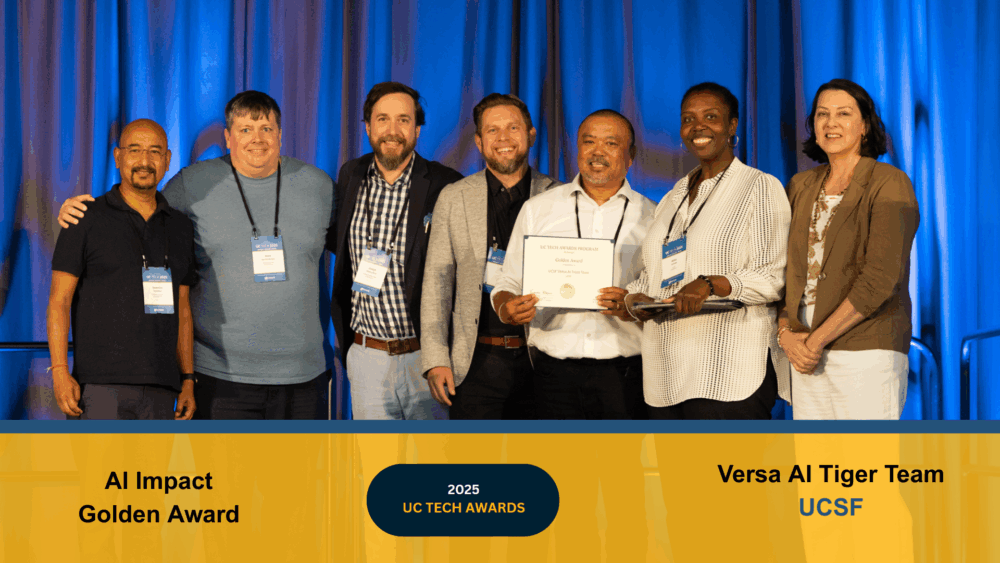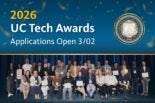Overview
The UCSF Versa AI Tiger team, with more than 50 team members across a range of specialties, won the Gold AI Impact Award at the 2025 UC Tech Awards. Versa is a secure, AI-powered platform developed at UCSF through cross-team collaboration, transforming workflow automation, research, and productivity across healthcare, education, and administration. Led by the AI Tiger Team, Versa supports thousands of users while ensuring responsible AI adoption, positioning UCSF as a leader in AI-driven innovation.
The Challenge
The rapid evolution of generative AI in 2023 presented both a transformative opportunity and a critical risk for higher education and healthcare institutions. At UCSF, a world-class academic medical center, the need for a secure, enterprise-grade AI solution became apparent as faculty, clinicians, researchers, and administrators began experimenting with external AI tools. However, these tools lacked security, compliance, and integration with UCSF’s protected data, posing significant privacy risks, ethical concerns, and operational inefficiencies.
Key challenges include:
- Security & Compliance – No generative AI solution existed at UCSF that met Health Insurance Portability and Accountability Act (HIPAA) and UC Office of the President Protection Level 3 and 4 (P3/P4) data security and ethical standards while enabling AI-assisted research and operations.
- Stakeholder Coordination – The initiative required alignment across multiple mission areas (Research, Education, Clinical, and Administration) and engagement with 18+ departments, each with unique needs.
- Rapidly Evolving AI Landscape – The AI industry’s fast pace meant UCSF had to quickly develop an internal AI platform, balancing flexibility with governance.
- No Precedent – The challenge was unprecedented in academic healthcare settings, requiring new policies, secure infrastructure, and rapid development to ensure safe AI deployment.
- User Demand & Productivity – With growing faculty and staff interest in AI, there was a need for scalable, user-friendly AI tools that could boost productivity while ensuring responsible AI use.
To address these challenges, UCSF formed the UCSF Versa AI Tiger Team, a multidisciplinary AI task force, to design, develop, and deploy a secure AI ecosystem—Versa—within an accelerated timeline.
The Approach
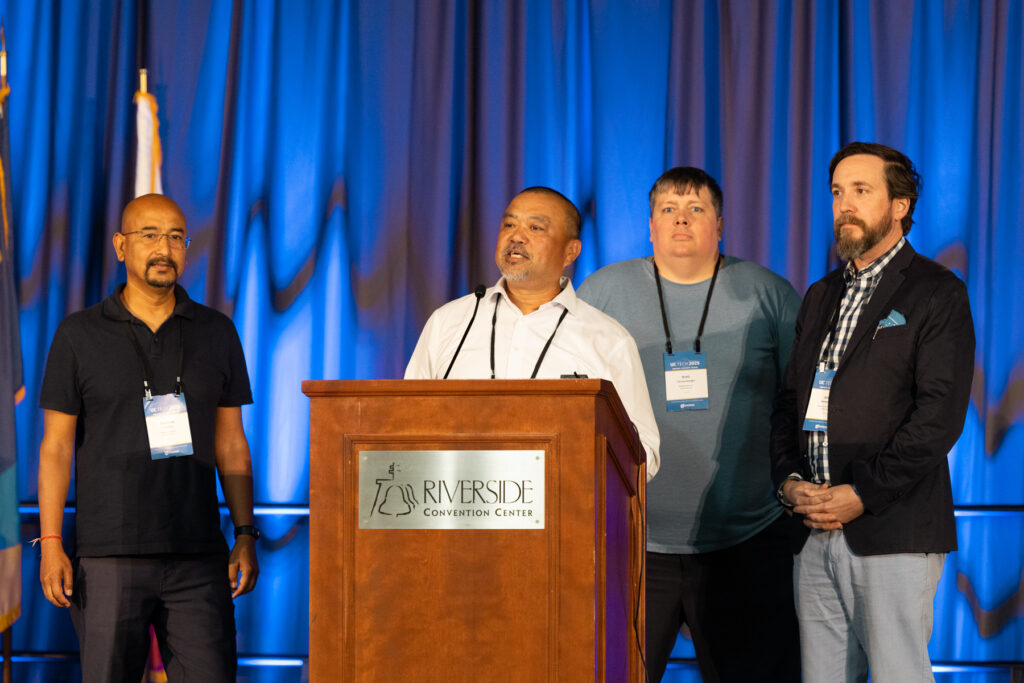
The UCSF Versa AI Tiger Team was formed to ensure UCSF’s AI adoption aligned with its mission of advancing health worldwide through research, education, patient care, and public service. Versa was designed to be an ethical, secure, and innovative AI platform, ensuring that UCSF users could leverage AI responsibly across different mission areas.
Steps taken include:
- Cross-Department Collaboration & Rapid Development (June–August 2023)
- Brought together 60+ contributors from 18+ teams, including IT, Research, Clinical Informatics, Education Technology, and Administration.
- Designed a scalable AI infrastructure that supports natural language interactions, workflow automation, and secure data handling.
- Conducted stakeholder interviews across UCSF to understand user needs and develop AI use cases.
- Ensuring Security & Compliance
- Established enterprise-grade AI security to handle P3/P4 data, ensuring compliance with UC IT Security policies, HIPAA, and data governance.
- Partnered with UCSF’s IT security, legal, and compliance teams to draft AI usage guidelines and implement access controls.
- Building a Versatile AI Ecosystem (see screenshot 1 – Versa Architecture)
- Developed Versa Chat & API Platform, enabling users to interact with AI securely.
- Implemented Retrieval-Augmented Generation (RAG) Assistants, allowing users to query enterprise data (in UCSF’s Data Warehouse called SCUBA) and access domain-specific AI tools.
- Designed Versa as a model-agnostic platform, capable of supporting multiple AI providers (currently OpenAI through Azure and Anthropic through AWS Bedrock), to ensure vendor flexibility.
- Developed a token counting and billing process to ensure API users are recharged for usage exceeding an allowance provided by UCSF IT.
- Driving Adoption & Education
- Launched AI workshops, training sessions, and governance discussions to educate UCSF staff, researchers, and clinicians on responsible AI use.
- Created a feedback-driven development model, iterating on real-world user feedback.
- Launched Generative AI Office Hours.
- Scaling Across UCSF
- Engaged with other UC institutions to share best practices in AI adoption.
- Provided AI policy guidance to UC IT leadership on governance and security.
- Through strategic action, UCSF’s AI Tiger Team successfully launched Versa within three months, ensuring that AI adoption at UCSF remained secure, responsible, and mission-aligned.
Screenshot 1 – Versa Architecture
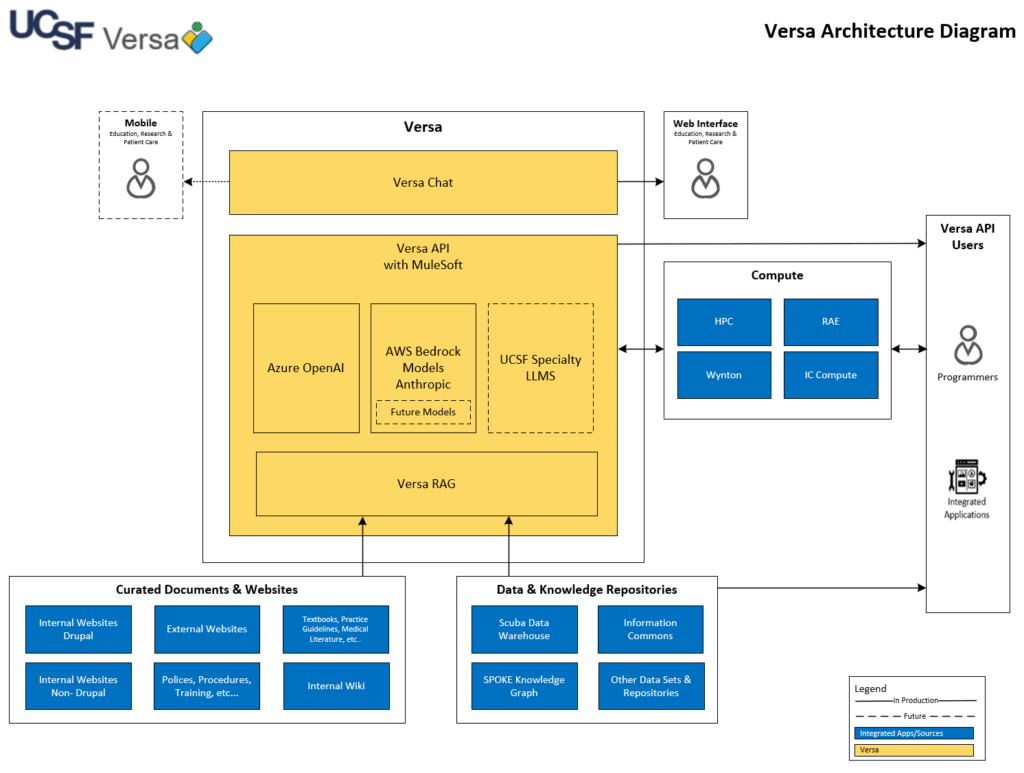
Versa was conceptualized, developed, and launched within three months in 2023, demonstrating unprecedented speed and impact:
- June 2023 – AI Tiger Team formed; stakeholder engagement began.
- July 2023 – Development of Versa Chat and API platform.
- August 2023 – Security review and first release of Versa Chat and Versa API.
- September 2023 to March 2024 – New waves of pilot users added to Versa Chat and API.
- March 2024 – a liver disease-specific large language model (LLM) developed using retrieval-augmented generation (RAG) through the UCSF Versa platform. The model was built by embedding customized data from publicly available American Association for the Study of Liver Diseases (AASLD) guidance documents into the Versa Chat platform.
- April 2024 – Enterprise rollout of Versa Chat and API.
- May 2024 – Retrieval Augmented Generation (RAG) capability added to Versa.
- August 2024 – SPOKE (Scalable Precision Medicine Open Knowledge Engine) knowledge graph, a curated, evidence-based, and up-to-date source of biomedical knowledge.
- December 2024 – Extended Versa platform to support multiple model vendors LLMs (Large Language Models) with Anthropic Claude through AWS Bedrock.
The Impact
Versa has dramatically transformed how UCSF leverages AI across research, education, administration, and clinical operations.
Key results and the scale of impact include:
- Rapid Adoption
- 6,000+ active users (up from 3,095 in early 2024), reflecting strong institutional demand.
- Over 15 billion AI tokens processed, demonstrating significant engagement.
- 30+ AI Assistants deployed, helping departments automate workflows.
- Advancing Research & Innovation
- Enabled 100+ AI-powered research projects.
- Facilitated over 100 academic publications, highlighting AI’s role in scientific discovery.
- UCSF researchers using Versa have secured over $500K in AI-related grants.
- Operational Efficiency & Workflow Automation
- Streamlined administrative workflows, saving hundreds of staff hours.
- Automated AI-driven policy summaries & report generation, reducing manual workload.
- AI-powered literature reviews and grant writing assistance led to faster research output.
- Enhancing Data Access & Security
- Versa now integrates with SCUBA (UCSF’s Data Warehouse), allowing natural-language queries for secure and efficient data retrieval.
- Secure AI use policies ensure UC Office of the President Protection Level 3 and 4 (P3/P4) data is handled responsibly.
- Fostering AI Governance & UC Collaboration
- UCSF has played a key role in AI governance discussions across UC, influencing systemwide AI policies.
- Versa has been showcased at multiple UC and national AI conferences, positioning UCSF as a leader in responsible AI adoption.
- Long-Term Impact & Sustainability
- Versa is now a foundational AI platform at UCSF, with continuous development and user-driven enhancements.
- UCSF’s approach has become a model for AI adoption at other UC institutions, fostering collaborative AI governance discussions across the system.
What’s Next
Coming up next are continuous enhancements including mobile app development, governance improvements, and expansion across UCSF. Versa continues to evolve with new AI capabilities, ensuring that UCSF remains a leader in secure AI adoption. See screenshot 2 – Product Roadmap.
Screenshot 2 – Product Roadmap
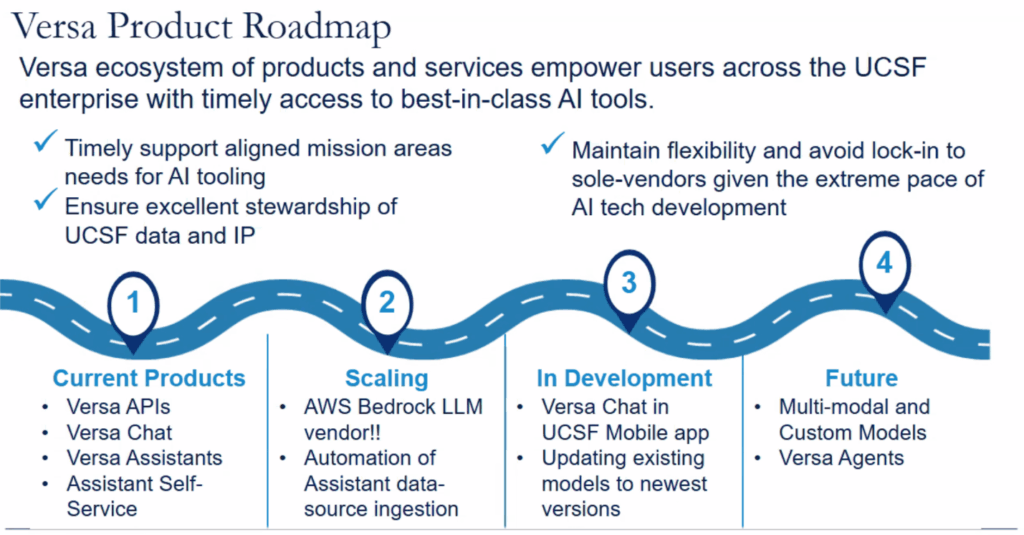
Meet the Award-Winning Team
Team Name: UCSF Versa AI Tiger Team
Award Category: AI Impact
Location: UCSF Health and UCSF Campus
2025 Gold AI Impact Award Winners:
| Name | Title | Department |
| Adam Stowe | RAE Team Lead | Research IT |
| Albert Dang | Product Designer | Health IT |
| Amethyst Saludo | Product Designer | Health IT |
| Anish Cleatus | System Integration Engineer | Integration |
| Anna Rubinksy | Lead Clinical Informatics Specialist | Research IT |
| Arjabi Thapa | Business Systems Analyst | Integration |
| Ashwini Sarvepalli | AI Developer Intern | Data Platforms |
| Beth Berrean | Deputy Director Design & Discovery | Research IT |
| Brett Gerstenberger | Integration Services Supervisor | Integration |
| Cesar Higueros | Director, Network Services | Network |
| Devin Church | System Integration Engineer | Integration |
| Edna Sin | Programmer Analyst | Information and Analytics |
| Ellen Clary | Business Systems Analyst | Research IT |
| Evan Phelps | Research Data Services Manager | Research IT |
| Govi Giri | Data Systems Analyst | Data Platforms |
| Hossein Soleimani | Data Science & Engineering Lead | Health IT |
| James Han | Network Engineer | Network |
| John Von Eichhorn | Associate Director, Service Desk | Service Desk |
| Joseph Owens | Senior Product Manager | Health IT |
| Josh Flesner | Azure DevOps Engineer | Cloud and Infra |
| Julia Wallace | Integration Services Manager | Integration |
| Kaizen Towfiq | Bio Informatics Programmer | Research IT |
| Ki Lai | VP, Chief Data Officer | Information and Analytics |
| Louie Torres | System Integration Engineer | Integration |
| Mandy Terrill | Associate CIO for Research | Research IT |
| Mark Rauschuber | VP/CIO, UCSF Health | Health IT |
| Mary Beth Saddoris | Director of UCSF IT Communications | Office of CIO-PMO |
| Mattice Harris | Enterprise Solution Architect | Cloud and Infra |
| MD Saud | Network Contractor | Network |
| Mimi Bronco | Business Analyst | Service Management |
| Mo Bagadi | Chief Technology Officer | Cloud and Infra |
| Nicki Martin | Senior Research Products Project Manager | Research IT |
| Oksana Gologorskaya | Lead Product Manager, Research Data Assets | Research IT |
| Patrick Phelan | Executive Director, Data Security | IT Security |
| Paul Miller | Research Data Sys Developer | Research IT |
| Paul Preamble | Azure DevOps Engineer | Cloud and Infra |
| Quinn Hearne | Manager, Risk Management & Compliance | IT Security |
| Raymond Kuang | ITSM Developer | Service Management |
| Rebecca Frazee | Digital Equity Education Analyst | Education IT |
| Remi Frazier | Manager, Research Systems & Tools | Research IT |
| Rhett Hillary | Associate Director, Research IT Infrastructure | Research IT |
| Rick Larsen | Director of Research Informatics | Research IT |
| Rob Schechtman | Health AI Oversight Committee Manager | Health IT |
| Sahil Banswal | Network Contractor | Network |
| Sam Walker | Data Warehouse Manager | Information and Analytics |
| Sara Murray | Chief Health AI Officer for UCSF Health | Health IT |
| Saurabh Nautiyal | Senior Network Engineer | Network |
| Steve Sun | Data Platforms Manager | Data Platforms |
| Susan Tincher | VP, IT Infrastructure | Cloud and Infra |
| Swarnim Ranjitkar | System Integration Architect | Integration |
| Tenzin Gurung | Security Analyst | IT Security |
| Veera Gopalakrishnan | Integration Services Team Lead | Integration |
| Victor Galvez | Associate Director, Integration & Data Platform | Integration |
| William Santo | Clinical Informatics Specialist | Research IT |
| Yatin Sadhwani | Senior Network Security Engineer | Network |
| Yelena Zayakina | Research App Support Analyst | Research IT |
Read More
Read the team’s complete UC Tech Awards application
Learn more about the UC Tech Awards Program
Contact

IT Director, IT – Enterprise Information and Analytics (EIA)
UCSF
[Cover image and photo of Victor Galvez provided by Andrew Castro.]

